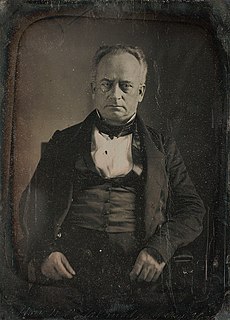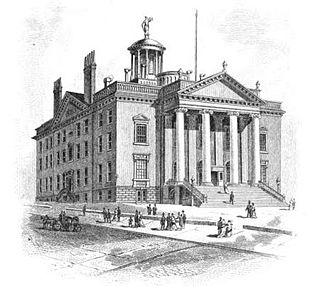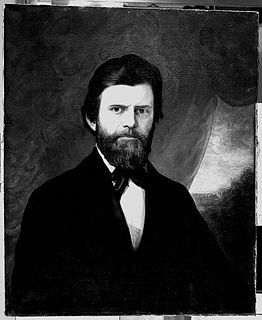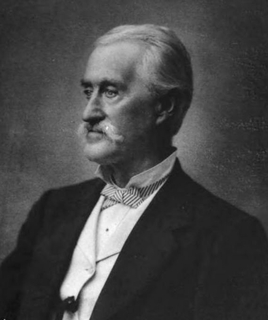Related Research Articles

William Christian Bouck was an American politician from New York. He was the 13th Governor of New York from 1843 to 1844.
The Commission to Explore a Route for a Canal to Lake Erie and Report, known as the Erie Canal Commission, was a body created by the New York State Legislature in 1810 to plan the Erie Canal. In 1817 a Canal Fund led by Commissioners of the Canal Fund was established to oversee the funding of construction of the canal. In 1826 a Canal Board, of which both the planning commissioners and the Canal Fund commissioners were members, was created to take control of the operational canal. The term "Canal Commission" was at times applied to any of these bodies. Afterwards the canal commissioners were minor state cabinet officers responsible for the maintenance and improvements of the state's canals.

Edward Eastman was known as an American merchant and politician from Oshkosh, Wisconsin, where he had moved as a young man from Vermont. He was active in civic and territorial affairs, and known as a Democrat and Free Soiler. In 1847 he was one of a partnership approved by the territorial legislature to build the first bridge across the Fox River in Oshkosh.

The 1839—1840 United States Senate election in New York was held on February 5, 1839 and January 14, 1840. Incumbent Senator Nathaniel P. Tallmadge was re-elected to a second term in office over scattered opposition.

The 68th New York State Legislature, consisting of the New York State Senate and the New York State Assembly, met from January 7 to May 14, 1845, during the first year of Silas Wright's governorship, in Albany.
John Hawkins Rountree was an American farmer, businessman, politician, and Wisconsin pioneer. He was the founder of Platteville, Wisconsin, and was instrumental in the early development of that village. He was also one of the founders of the Northwestern Mutual Insurance Company, and remained a director in the company until his death. In politics, he represented Grant County for five years in the Wisconsin Legislature, and was a delegate to Wisconsin's 2nd constitutional convention in 1847.
Parker Warren was an American farmer from Beaver Dam, Wisconsin who served a one-year term in 1849 as a Free Soil Party member of the Wisconsin State Assembly from Dodge County.
Adam E. Ray was an American farmer politician from Troy, Wisconsin who served several terms in the Legislature of Wisconsin Territory, and a single term in 1851 as a Free Soil Party member of the Wisconsin State Assembly from Walworth County.
Armstead, Armisted, Armistead C. or A. C. Brown was an American farmer, miner and lawyer from Wisconsin and later California, who served a single term in the 1st Wisconsin Legislature as a Whig member of the Wisconsin State Assembly. He then moved to California as a Forty-Niner, where he became one of the founding fathers of Amador County, becoming a merchant, judge and legislator in Jackson, California.
William Wells Brown or W. W. Brown was an American merchant and pioneer settler of Milwaukee, Wisconsin. He was a member of the Wisconsin State Assembly for the 1st Wisconsin Legislature (1848).
Joseph Bond was a pioneer settler of what became Waukesha County in the Wisconsin Territory, and an active Democratic politician, serving in the territorial legislature and later in the Wisconsin State Assembly as well as holding local offices.

The 1849 Wisconsin gubernatorial election was held on November 6, 1849. Democrat Nelson Dewey won the election with 52% of the vote, winning his second term as Governor of Wisconsin. Dewey defeated Whig Party candidate Alexander L. Collins and Free Soil Party candidate Warren Chase.
William H. Johnson was a farmer from Fort Atkinson, Wisconsin who spent a single one-year term as a Democratic member of the Wisconsin State Assembly from Jefferson County during the 1849 session, succeeding fellow Democrat Ninian E. Whiteside.

Alexander Lynn Collins was an American lawyer, judge, and politician. He was an important leader of the Whig Party in the early years of Wisconsin, serving as party chairman, nominee for United States Congress, for United States Senate, and for Governor of Wisconsin. He also served as a Wisconsin Circuit Court Judge and a member of the University of Wisconsin Board of Regents. In historical documents, his middle name is sometimes spelled "Linn" and he is sometimes referred to as "A. L. Collins."
Paul Crandall was a farmer from Lima, Wisconsin who spent a single one-year term as a Whig member of the Wisconsin State Assembly from the district of Rock County consisting of the towns of Beloit, Clinton and Turtle, during the 1849 session. He succeeded fellow Whig Robert T. Carey, and would be succeeded in 1850 by another Whig, John A. Segar.
Robert R. Young was an American from Grant County, Wisconsin - sometimes reported as being from Wyalusing, sometimes as from Hazel Green) who served a single term in the 1849 2nd Wisconsin Legislature as a Whig member of the Wisconsin State Assembly from Grant County.
Jedediah Kimball was a farmer from Portland, Wisconsin who served a single one-year term in 1849 as a member for the 4th Wisconsin State Assembly district from Dodge County. At the time of taking office, he was 38 years old, and had been in Wisconsin four years. He is believed to have been a Democrat; he succeeded Monroe Thompson, a Whig, and was succeeded by Democrat William T. Ward.
Chauncey Moss Phelps was an American farmer and politician who held office in two counties, as well as in the legislatures of the Territory and State of Wisconsin.
Peter Turck often misspelled Turek was a farmer from Mequon, Wisconsin who served a single one-year term as a member of the Wisconsin State Assembly.
Davis Gillilan or Gillilian was an American merchant, miner and politician from Dubuque, Wisconsin Territory and Potosi, Wisconsin who held various elected offices in Dubuque and served a single one-year term as a Democratic member of the Wisconsin State Assembly from Grant County.
References
- ↑ State of Wisconsin Legislative Reference Bureau. "Members of the Wisconsin Legislature 1848–1999". Information Bulletin 99-1 (September 1999), p. 91.
- ↑ "Sec. 16", Wisconsin Argus March 25, 1847; p. 2, col. 3 via Newspapers.com